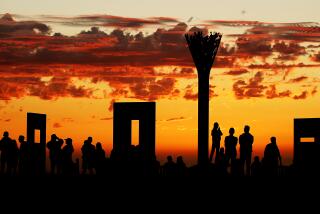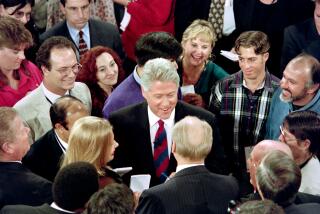Bush’s Rustic Vacation Continues Clinton Contrast
- Share via
Maybe George W. Bush is carrying this I’m-not-Bill-Clinton thing too far. Sure Bush has gotten a lot of mileage out of his personal contrasts with Clinton. But spending a month in the Texas dust seems an overly emphatic recoil from Clinton’s preference for chic vacations around the beautiful people.
It is, though, like all presidential choices, revealing in its own ways. Much of Bush’s style in the White House seems designed to subtly reassure his supporters that he’s nothing like the predecessor they loathed for eight interminable years. The White House edict mandating coats and ties in the Oval Office can be read as a slap at the informality of the Clinton years. Bush’s preference for crisp corporate scheduling rejects the college bull-session atmosphere that Clinton sometimes encouraged.
The differences extend to their public images. Bush is taciturn where Clinton was loquacious. And while Clinton used the White House megaphone to insert himself into nearly every social controversy, Bush uses the bully pulpit more sparingly than any president in recent times. Part of that may reflect his staff’s uncertainty about his skill at delivering formal speeches or sparring with the press in news conferences. But his lower profile also reflects the suspicion of eloquence itself that Clinton’s presidency left in conservative circles. The White House seems to be telling voters that Bush may be a man of fewer words than his predecessor, but at least you can always trust his words. In the White House iconography, Bush is Gary Cooper to Clinton’s Elmer Gantry.
Even Bush’s more modest workday and regular midday diversions (like his Oval Office visits with athletes and T-ball games on the White House South Lawn) may signal that he sees politics as a lesser part of his life than his predecessor did. Whatever it says about his attitude toward cracking the books, Bush’s more relaxed approach to the job also reinforces his central policy message. The subtle hint to his supporters is that unlike Clinton, Bush doesn’t need to spend hours dreaming up new Washington initiatives because he believes that often the best thing Washington can do is nothing.
Which brings us back to the president’s monthlong vacation in Crawford, Texas. Two aspects of the vacation are head-turning: the length and the location. The Washington Post calculated that when Bush’s four weeks in Texas were finished, he will have spent 42% of his presidency on vacation, or en route to it. Even allowing for the occasional hours spent mulling a big decision (like last week’s stem cell announcement), that’s still a lot of time away from the grind. Which could either demonstrate how committed Bush is to proving that Washington should take itself less seriously, or how averse he is to long hours.
Then there’s the location. Clinton was famous (or infamous) for allowing advisor Dick Morris to poll voters on where he should vacation. In Crawford, Bush has picked a vacation spot that no pollster, let alone any travel agent, would select. The president, in fact, may be the first person in history to vacation for a month in greater Waco--in August, no less.
All of this might seem silly. Except a significant part of Bush’s support does seem based on cultural, rather than policy, affinities. It’s impossible to quantify the exact proportion. Yet many of the people who like Bush seem drawn at least as much to the traditionalist moral and cultural values he represents--and their implicit contrast to Clinton--as any particular policy he offers.
One measure of that dynamic came in last year’s election results. Voters divided much more along lines of culture than economics. Al Gore and Bush spent months debating whose economic plan offered more to the middle class and whether Bush’s tax cut was tilted toward the rich; they said almost nothing about cultural issues such as abortion or guns. Yet church attendance predicted the vote far better than income: The more often you attended church, the more likely you were to support Bush.
Small-town and rural America went big for Bush; the cosmopolitan big cities backed Gore just as enthusiastically. The now famous red-and-blue election map showed Bush winning vast stretches of territory across the heartland; the president seemed to carry every county in America with a cow in it. He probably lost every town big and arty enough to support a foreign movie house. Rarely in U.S. politics has the old British maxim seemed so apt: Where you stand depends on where you sit.
Nearly a year later, remarkably little has changed. When asked to choose between Bush and Gore in a CNN/Gallup/USA Today poll last week, Americans again divided exactly in half--48% for Bush, 48% for Gore. The cultural chasm remained huge. Bush carried rural voters by a dozen percentage points and lost urban voters by 14. Bush led by 15 percentage points in the South and trailed by 20 in the East. Married voters liked Bush, single voters, Gore. Women who stayed at home with children preferred Bush, women who worked outside the home, Gore. Americans who attend church at least weekly gave Bush a big edge; those who worship less often (or not at all) backed Gore. The bottom line: It’s still two nations.
It’s tempting to see Bush’s choice of Crawford as an implicit acceptance of this division. He might not feel welcome in the beauty spots along the coasts because he didn’t carry any of them. (At least none above the Mason-Dixon line, where there’s a chance of catching a cool breeze this time of year.) Bush won McLennan County, which includes Crawford, by a ratio of almost 2 to 1. Last week, when reporters asked him (in so many words) why he considered heat and dust a vacation lure, Bush suggested he didn’t want to be a member of any club that wouldn’t have him: “I know a lot of you wish you were in the East Coast . . . sucking in the salt air, but when you’re from Texas--and love Texas--this is where you come home.”
Bush might have added that Crawford, not Martha’s Vineyard, is the kind of place that elected him president. He is not spending August amid the breezy pleasures of summer vacation at the ocean--much less the parties on the patio, with white wine and media gossip, that Clinton glided through. But Bush has planted himself in the America that supports, and even reveres, his presidency, and maybe that is pleasure enough.
*
Ronald Brownstein’s column appears every Monday. See current and past Brownstein columns on The Times’ Web site at: https://www.latimes.com/brownstein.
More to Read
Get the L.A. Times Politics newsletter
Deeply reported insights into legislation, politics and policy from Sacramento, Washington and beyond. In your inbox twice per week.
You may occasionally receive promotional content from the Los Angeles Times.










